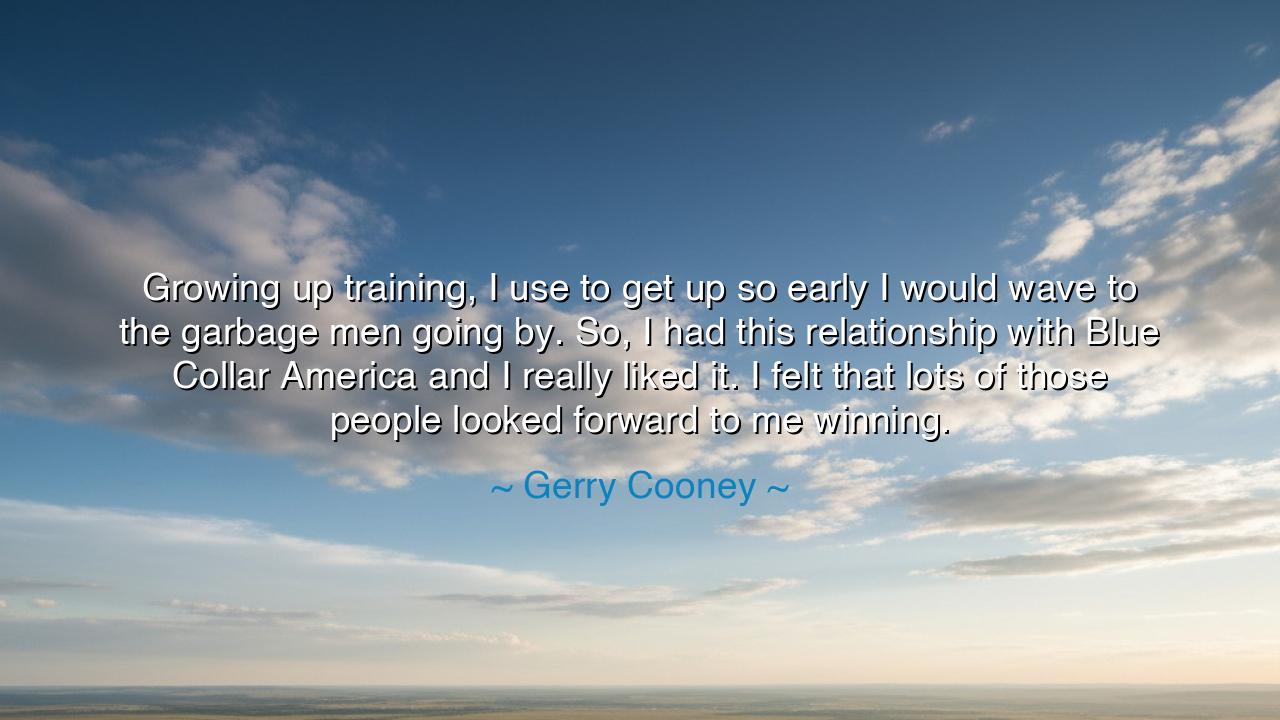
Growing up training, I use to get up so early I would wave to
Growing up training, I use to get up so early I would wave to the garbage men going by. So, I had this relationship with Blue Collar America and I really liked it. I felt that lots of those people looked forward to me winning.






Hear the humble and heartfelt words of Gerry Cooney, a warrior of the ring, who reflects upon his youth: “Growing up training, I used to rise so early that I would wave to the garbage men going by. So, I had this relationship with Blue Collar America, and I really liked it. I felt that many of those people looked forward to me winning.” These words reveal not only the discipline of an athlete, but also the bond between the fighter and the working people whose lives are built upon toil and perseverance.
To awaken early, before the sun itself has climbed into the heavens, is to walk the path of dedication. While others slept, Cooney labored, his body and spirit honed through countless hours of training. In those quiet, lonely mornings, he would greet the garbage men, whose own labor began before the day’s first light. In this simple gesture, a kinship was formed, a silent recognition that both shared the struggle of rising each day to face hardship head-on.
This bond with Blue Collar America ran deep. These were the men and women who worked with their hands, who bore the weight of society’s burdens without praise or glamour. In Cooney’s relationship with them, he found strength and inspiration. Their lives mirrored his own fight — not in the ring, but in the endless bouts against fatigue, poverty, and unseen challenges. His victories became theirs, symbols of hope that hard work and resilience could triumph.
When Cooney says that they looked forward to him winning, he speaks of a profound truth: the hero does not fight for himself alone. Just as ancient champions carried the dreams of their tribes into battle, so too did Cooney carry the hopes of the working class with every strike and every round. His triumphs were a shared celebration, proof that those who labor in obscurity are not forgotten.
Let future generations remember this lesson: greatness is not born in isolation, but in connection. The fighter, the artist, the leader — all stand upon the shoulders of those who rise before dawn and toil without recognition. To honor them is to win not only for oneself, but for all who silently struggle, carrying the weight of the world with unbroken spirit.






LNNgoc huyen Le nguyen
I find it fascinating that Gerry Cooney had such a strong connection to the working-class community, feeling like they were all rooting for him. Does this sense of shared experience give an athlete a sense of purpose beyond just winning? Can athletes truly balance the expectations of their personal aspirations with the hope that their success will inspire or benefit others? How do you carry that weight, and does it help or hinder your performance?
QPphan quang phu
Gerry Cooney’s words about feeling connected to Blue Collar America highlight how athletes often become symbols of their communities. How does this sense of belonging and mutual support shape an athlete’s motivation and performance? Is there a sense of responsibility when you know people are counting on you? How does the pressure of representing a whole group affect an athlete mentally and emotionally? Can that connection help you perform better, or does it become a burden?
TN21. Nguyen Trong Nam
This quote from Gerry Cooney makes me think about the relationship between fame and the people you come from. It’s interesting how Cooney seems to value the everyday work ethic of the blue-collar community. But how does that sense of connection influence an athlete’s journey? Is it easy to maintain that humble connection as you rise in fame, or does success create distance between you and the people who once supported you? How do you stay grounded?
LLam
Gerry Cooney’s quote reflects a deep connection to working-class values and the sense of community in Blue Collar America. I’m curious—how does that early morning interaction with the garbage men shape his perspective on success and hard work? There’s something touching about how Cooney felt that the working class was rooting for him. Can athletes truly feel that sense of responsibility to their communities? Is it motivating to know that your success impacts others in such a personal way?